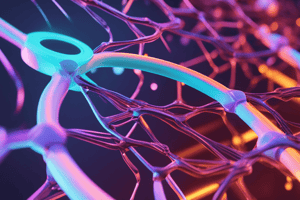Podcast
Questions and Answers
विद्युत संभावित ऊर्जा क्या होती है?
विद्युत संभावित ऊर्जा क्या होती है?
एक विद्युत धारित द्वारा एक विद्युत ध्वनि में रखा गया संभावित ऊर्जा है।
इलेक्ट्रोकेमिस्ट्री में त्रि प्रकार के प्रतिक्रियाएँ कौन-कौन सी होती हैं?
इलेक्ट्रोकेमिस्ट्री में त्रि प्रकार के प्रतिक्रियाएँ कौन-कौन सी होती हैं?
कम होना, ऑक्सीकरण, और परिवर्तन।
कम होने का क्या अर्थ है?
कम होने का क्या अर्थ है?
एक प्रतिक्रिया जिसमें धारक (कम करने वाला एजेंट) द्वारा इलेक्ट्रॉन प्राप्त किए जाते हैं और उत्पाद (ऑक्सीकरण करने वाला एजेंट) द्वारा खो दिए जाते हैं, जिससे उत्पादों में प्रारंभिक की तुलना में इलेक्ट्रॉन घनत्व बढ़ जाता है।
ऑक्सीकरण क्या है?
ऑक्सीकरण क्या है?
प्रमुखी द्वारा क्या समझा जाता है?
प्रमुखी द्वारा क्या समझा जाता है?
क्या है ऑक्सीकरण और क्या परिणाम होता है?
क्या है ऑक्सीकरण और क्या परिणाम होता है?
इलेक्ट्रोलिसिस क्या है और इसका क्या महत्व है?
इलेक्ट्रोलिसिस क्या है और इसका क्या महत्व है?
बैटरी और फ्यूल सेल काम कैसे करते हैं और उनमें क्या अंतर है?
बैटरी और फ्यूल सेल काम कैसे करते हैं और उनमें क्या अंतर है?
विस्तार कीजिए कि इलेक्ट्रोकैमिस्ट्री कैसे रोजमर्रा की जिंदगी में देखे जाने वाले व्यवहार की समझ करने के लिए मौजूदा अंतराल का एक मौलिक ढांचा प्रदान करता है।
विस्तार कीजिए कि इलेक्ट्रोकैमिस्ट्री कैसे रोजमर्रा की जिंदगी में देखे जाने वाले व्यवहार की समझ करने के लिए मौजूदा अंतराल का एक मौलिक ढांचा प्रदान करता है।
क्या होता है जब एक सेल पर वोल्टेज लागू किया जाता है, जैसे कि पानी में विद्युत घोल शामिल हो?
क्या होता है जब एक सेल पर वोल्टेज लागू किया जाता है, जैसे कि पानी में विद्युत घोल शामिल हो?
Flashcards are hidden until you start studying
Study Notes
Chemistry: Focusing on Electrochemistry
Electrochemistry is a branch of chemistry that deals with the relationships between electricity and chemical reactions. It's concerned with the flow of electricity through matter and how this process leads to various chemical changes in materials. In essence, it's the study of the interaction of electric potential energy within systems due to chemical processes.
Electric Potential Energy
Electric potential energy refers to the potential energy stored by an electric charge in an electric field. When two charges approach each other, they interact, and if one has more electrical potential energy than its environment at rest, this difference can do work when the charges move relative to their surroundings. This concept lies at the heart of many aspects of physics and chemistry.
Types of Reactions in Electrochemistry
In order to understand the basis of electrochemical cells, we must first consider three types of reactions that underlie all classical electrochemistry and which occur either spontaneously or nonspontaneously: reduction, oxidation, and interconversion:
-
Reduction: A reaction where electrons are gained by the reactant (reducing agent) and lost by the product (oxidizing agent), resulting in increased electron density in the products compared to the reactants.
-
Oxidation: A reaction where electrons are lost from the reactant (reducing agent) and gained by the product (oxidizing agent), leading to decreased electron density in the products compared to reactants.
-
Interconversion: A combination of reduction and oxidation processes occurring simultaneously.
Electrolysis
One practical application of electrochemistry is electrolysis, which involves using an external source of direct current (DC) to drive chemical reactions through corrosion, galvanic action, deposition, and refining in any substance capable of conducting electricity—an electrolyte. By applying a voltage across a cell, such as water containing dissolved salts, hydrogen gas will evolve at the negative terminal and oxygen gas at the positive terminal. These gases may also form minerals or deposits on the terminals themselves.
Batteries and Fuel Cells
Both batteries and fuel cells operate based on similar principles found in electrochemistry. They convert chemical energy directly into electrical energy via redox reactions at their respective electrodes. However, whereas batteries store and release energy over time, fuel cells continuously generate power without relying on precharged chemicals like those in battery packs.
To summarize, electrochemistry brings together the concepts of electricity and chemical reactions to explain phenomena observed in everyday life. From understanding the behavior of metal corrosion to generating electricity continuously, electrochemistry provides a fundamental framework for exploring these interactions.
Studying That Suits You
Use AI to generate personalized quizzes and flashcards to suit your learning preferences.




